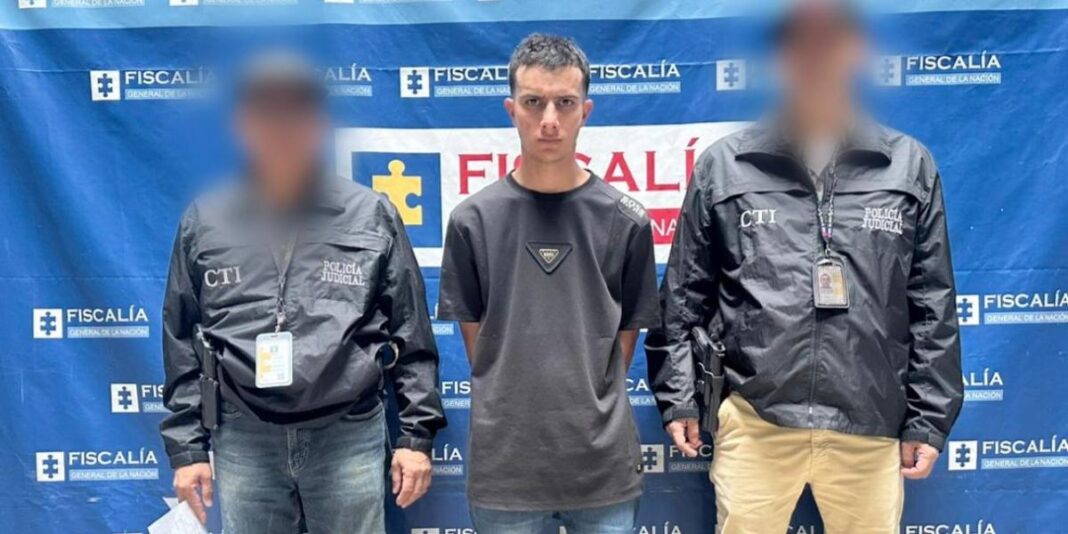Medellín — It’s a city that hums with the heartbeat of resilience, a place where people have learned to navigate shadows and light in equal measure. But for the employees of several supermarkets in Medellín and the Valle de Aburrá, the shadows loomed darker over the past year. A man, Davinson Flórez Laverde, already bound by the limitations of house arrest, managed to slip through legal confinements and allegedly orchestrated 40 armed robberies. How did a young man tethered to the law’s restrictions continue to elude them? The answer lies in a story of audacity, loopholes, and a city grappling with both fear and courage.
The Man Behind the Mask: House Arrest, but No Limits?
It seems unfathomable—an individual already sentenced to house arrest for similar crimes allegedly rampaged through supermarkets, gun in hand, threatening staff as if the boundaries of his punishment were invisible. According to the Fiscalía General de la Nación, Flórez’s criminal ventures stretched over several months, from June to September 2023, during which he violated his court-ordered house arrest imposed in February. This wasn’t just a young man breaking the law; it was a systemic failure, one that allowed him to terrorize the community repeatedly.
How Does House Arrest Fail?
House arrest is designed to keep offenders confined, out of the public sphere, often monitored by an ankle bracelet or similar tracking device. But in Flórez’s case, it’s as though those walls never existed. Authorities revealed that he managed to slip away from the confines of his home to rob supermarkets, each time with a more brazen attitude. Flórez would walk into these establishments under the guise of a regular shopper, only to transform into a predator at the register, pulling out a firearm and demanding money. Employees were left shaken, forced into compliance as they handed over cash, knowing their lives could depend on their swift obedience.
In six known instances, Flórez violated his house arrest with complete disregard for the legal system designed to rein him in. His actions were bold, certainly, but they also reveal the fragility of a system that should have held him in place. A system that failed.
Medellín’s Supermarkets Under Siege: City’s Trust Shaken
Supermarkets in Medellín are more than just places to buy groceries. They are community pillars, spaces of routine comfort where families gather essentials and employees greet familiar faces. For these 40 robberies to take place, all in chain stores spread across Medellín and the greater Valle de Aburrá, means more than just financial loss—it shatters the trust of a community already weary of violence.
With an estimated 45 million Colombian pesos stolen across these robberies, it’s not just the economic impact that stings; it’s the psychological one. Fear lingers long after the threat is gone, and in a place like Medellín—where people have fought for peace and stability—the return of such blatant criminality strikes deep.
Bravery in the Face of Threat
Imagine yourself as one of these employees. The mundane act of ringing up groceries suddenly shifts into a life-or-death scenario when a gun is pointed your way. Brigadier (r) Pablo Ruiz, the subsecretary operative of Medellín, detailed the terrifying moments when Flórez would drop his facade of civility, threatening employees to empty cash registers at gunpoint. One after another, supermarkets fell victim to his scheme, and each time, employees had no choice but to comply, their lives hanging by a thread.
Legal System in Crisis: What Happens When House Arrest Is Not Enough?
The case of Davinson Flórez Laverde is more than just a story of a young man gone astray—it is an indictment of a system that should have contained him. How does someone under strict judicial supervision manage to leave their home repeatedly, to terrorize an entire city’s commercial sector?
Loopholes in Monitoring
House arrest often relies on electronic monitoring systems, but these devices are not foolproof. It’s unclear how Flórez evaded detection, though questions are now being asked about the effectiveness of his supervision. In some instances, offenders can tamper with their monitoring equipment or find ways to exploit gaps in enforcement. But this case feels different—40 robberies are not the work of a man slipping out once or twice unnoticed; it’s the behavior of someone who knew exactly how to play the system.
The Road Ahead: Accountability and Reflection
When Davinson Flórez was finally captured on September 27 in Bello, a weight lifted off the city. But the damage had already been done. As the community reflects on these events, one thing is clear: there’s more at stake here than just the crime. This is about how we hold people accountable—not just individuals like Flórez, but the systems that are meant to confine them, to prevent their harm.
For now, Flórez maintains his innocence, having rejected the charges laid against him. The legal battle ahead may prove lengthy, but for the people of Medellín, there’s no forgetting what’s already happened. As investigations continue, perhaps we’ll come to understand the full extent of how a man under house arrest committed such brazen crimes, but for now, the city can only hope that its trust, once shattered, can somehow be pieced together again.
Conclusion: Rebuilding Trust, One Step at a Time
There’s something uniquely unsettling about the image of a man confined to his home, walking freely through the doors of a supermarket with bad intentions. It’s not just a failure of one person; it’s a fracture in the way we think about justice, about safety. Medellín, a city that has seen its fair share of battles, now faces a different kind of reckoning. Can the system be fixed? Can trust be restored?
As we look ahead, the people of Medellín will have to answer these questions not with words but with action—with new systems, stricter enforcement, and perhaps most of all, with the hope that something like this never happens again.


